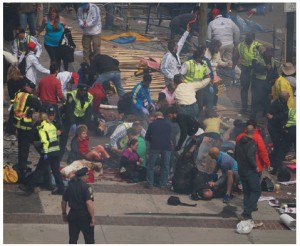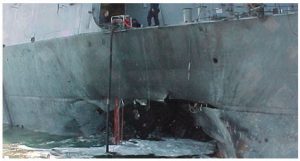
It’s like the 1979 horror sci-fi flick Alien. Just when you think the monster is dead, it jumps out at you again. A recurring nightmare.
It was not so long ago that some security experts and officials were elatedly predicting al-Qaeda’s demise and with it, the end of Islamic extremism and the Jihadist threat to Western democracies. The killing of Osama bin Laden at the hands of a specially trained team of American SEALS at his Abbottabad hideaway in northern Pakistan was seen as striking the movement a death blow. The statistical evidence also seemed to weigh in favour of such arguments. Since 2005, the world saw a steady decline in the number of terrorist attacks. Most of the attacks were also centred in Iraq and Afghanistan and directed by rival extremist groups against each other and not westerners.

U.S. intelligence and security forces could also claim they had successfully foiled terrorist attacks on American soil. That was true until the Boston Marathon bombing on April 15, 2013, that killed three spectators and maimed scores more. In spite of the billions of dollars poured into the Department of Homeland Security, the FBI apparently repeatedly ignored warnings from Russian intelligence services that Tamerlan Tsarnaev, the elder brother involved in the marathon attack, was a terrorist suspect and had to be watched closely.
However, because there had been no major attacks on the scale of 9/11, President Barack Obama nevertheless went on publicly to declare a month later that the “Global War on Terror” was finally over. The president also announced that U.S. strategy would shift to targeting specific terrorist networks, which many interpreted as justification for the escalating use of drone strikes against terrorist groups and their leaders.

The reality, however, was that the social and political turmoil that followed the Arab Spring unleashed deep currents of Islamist extremism and sectarianism that many Western leaders were unwilling to recognise.
The Obama administration’s early and repeated denials that the deadly al-Qaeda-orchestrated attacks in 2012 on the American compound in Benghazi, Libya, which killed the American ambassador, seems to have been motivated more by Mr. Obama’s presidential re-election ambitions than any kind of careful assessment of facts on the ground. As a comprehensive U.S. Senate Intelligence Committee report on the entire Benghazi affair, released in January 2014, laid bare, al-Qaeda operatives were indeed behind the well-planned attack on the Benghazi compound.
Recent events demonstrate that Islamic extremism is in ascendancy, not just in Libya and the Maghreb, but also sub-Saharan Africa, South Asia, parts of Southeast Asia and, above all, the Middle East, where new extremist groups, such as Iraq’s new Sunni-led ISIS group (Islamic State of Iraq), are supplanting even al-Qaeda’s reputation for brutality and violence as the cruel execution of American journalists James Foley and Steven Sotloff posted by their captors on the Internet, attests.
Canadians had a taste of the resurgent threat posed by Islamic extremists when two of the country’s senior diplomats, Robert Fowler and Louis Guay, were kidnapped by a branch of al-Qaeda in the Islamic Maghreb (AQIM) just before Christmas in 2008 while on a peace mission for UN Secretary General Ban Ki-moon in Niger. Held captive in the desert border regions of northern Niger and Mali, their release after 130 days in captivity came only after a tidy ransom of more than a million dollars was proffered to their captors.
The brutal kidnapping of 223 schoolgirls in northern Nigeria by the terrorist group Boko Haram in April 2014 is a further and ominous reminder of the growing power of extremists in sub-Saharan Africa. Like its Horn of Africa counterpart, the goal of Somalia’s al-Shabaab (responsible for the shopping mall attack in Nairobi, Kenya, that killed many civilians, including a young Canadian diplomat), is to destabilise governments in the region, eventually overthrow them and replace them with Islamic rule. Boko Haram is clearly sowing mayhem with its unscrupulous kidnapping and bombing attacks that have reached the doorstep of Nigeria’s capital city, Abuja, and its thriving commercial coastal metropolis, Lagos.
But it is not only Africans who have to worry about this group as it capitalises on its newfound notoriety. In February 2012, Boko Haram publicly threatened to assassinate U.S. Ambassador Terence McCulley if the U.S. helped Nigeria with its counterterrorist operations. Intelligence and security experts have also warned that Nigeria’s daily air links with Europe and North America are another key vulnerability that could also be exploited should the group decide to take its campaign of terror to the skies and overseas.
Alas, the Obama administration’s state of denial that was so painfully evident in the Benghazi affair extended to Boko Haram. Washington’s Politico magazine reported that when Hillary Clinton was U.S. secretary of state, she refused to declare Boko Haram a terrorist organisation or acknowledge that it had links with al-Qaeda. Her position was at direct odds with the U.S. Justice Department and America’s military commander for Africa’s own independent assessments, which showed such ties exist and include training, arms, and direct financial support.
Civil wars in Algeria, Yemen, Syria and Iraq have spawned their own terrorist networks as radical Islamic groups intent on seizing power acquire new followers, cash and weaponry. The ISIS group in Iraq has gained special notoriety in recent months because of the speed with which it seized control of large sections of territory in western Iraq by defeating American-equipped-and-trained Iraqi government forces in a series of lightning raids. It is now using its captured booty and weaponry to build up its own assets in its bid to seize power. That may be a long shot because Sunnis are in the minority in Iraq and the United States is now deploying its own airpower to help Kurdish forces repeal ISIS forces in northern Iraq.
Former U.S. ambassador to Iraq Ryan Crocker has called ISIS the biggest national security threat to the United States since 9/11 and he may well be right. During the summer of 2014, airport security officials in countries that are major points of embarkation to the United States started to beef up security measures by telling passengers to turn on their computers and cellphones following new intelligence reports indicating that terrorist groups in Yemen and Syria had developed a new way to conceal explosives in the flat batteries of such devices.
But the threat is not simply “over there.” It is also here at home. That James Foley’s executioner was a British citizen — one of hundreds of foreign nationals who have joined Islamic fighters in Syria — shows that the West is not immune from the cancerous appeal of Islamic extemism. Western countries, Canada included, will have to be more vigilant in their own efforts to deal with those who are seduced by extremist Islamic ideals.
In Canada, the successful apprehension of Raed Jaser and Chiheb Esseghaier, who were allegedly trying to blow up a VIA train bound for New York only two days after the Boston Marathon bombings, served as a stark reminder that Canada is on the al-Qaeda hit list. Xristos Katsiroubas and Ali Medlej, two young Ontario men who were involved in leading the terrorist attack on a gas plant in southeastern Algeria, serve as further reminders that we are also exporting our own homegrown terrorists.
The problem of homegrown terrorism is only going to get worse as disaffected and unemployed youths in the West are seduced by religion and identity politics to the killing fields of the Middle East, North Africa and other distant corners of the world. That is the harsh reality of the new age of terror.
Fen Osler Hampson is a Distinguished Fellow and Director of Global Security & Politics at the Centre for International Governance Innovation (CIGI) and concurrently Chancellor’s Professor at Carleton University.





